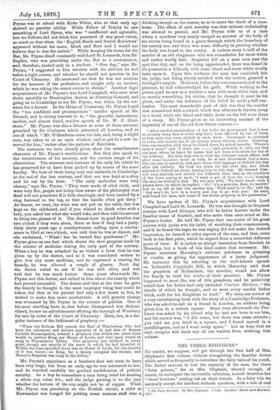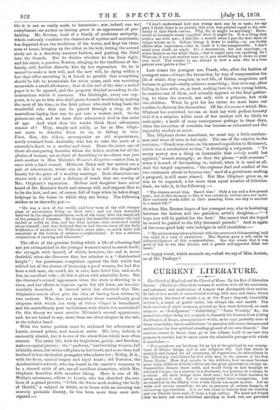THE THREE BROTHERS.*
No reader, we suppose, will get through the first half of Mrs. Oliphant's first volume without recognizing the familiar device which served so frequently to introduce the fairy tales of his youth. The father anxious to test the capacity of his sons, the three "fairy princes," for so Mrs. Oliphant, shrewd enough, of course, to anticipate the inevitable criticism, herself describes her "three brothers" setting out on their travels. In a fairy tale we naturally accept the incident without question, with a tale of real • The Three Brothers. By Mrs. Oliphant. 3 vols. London: Hurst and Blaokett. 1870.
life it is not so easily made to harmonize ; nor, indeed, can we compliment our author on having given it an appearance of pro- bability. Mr. Renton, head of a family of moderate antiquity, which curiously combines the characters of squires and merchants, has departed from the traditions of his house, and kept his three sons at home, bringing up the eldest as his heir, letting the second Study art in a desultory amateur fashion, and putting the third into the Guards. But he doubts whether he has done right, and his sister, a genuine Renton, clinging to the traditions of the family, still further disturbs him by her reproaches. So he is moved to make a new will, and the new will, he dying within a few days after executing it, is found to provide that everything should be left to accumulate for seven years, each son receiving meanwhile a small allowance ; that at the end of the time a sealed paper is to be opened, and the property divided according to the instructions which it contains. The birthright, every one sup- poses, is to go to him who shall prove himself worthiest by making the most of his time, to the fairy prince who shall bring back the wonderful robe that can be passed through a ring, or the marvellous lapdog that can be put into a walnut shell. So the princes set out, and we have their adventures told in due order of age. And what does the reader think those adventures consist of ? Why, simply and solely, as far as Mrs. Oliph-
ant cares to describe them to us, in falling in love. First, Ben, the eldest, accompanies an old acquaintance, newly returned from Australia, who has to take the news of a comrade's death to a mother and sister. There the sister, one of those all-conquering beauties whom the ladies, zealous for all the glories of women, are so fond of describing to us—there was just such another in Miss Muloch's Woman's Kingdom—smites him at
once with a fatal wound. Millicent Tracy and her mother are a pair of adventurers, whose aim in life is to sell the daughter's beauty for the price of a wealthy marriage. Both characters are drawn with a skill and a delicacy of touch that are worthy of Mrs. Oliphant's reputation. Mother and daughter have never
heard of Mr. Renton's death and strange will, and suppose Ben to to be the heir, and are, of course, full of hope when he takes dingy
lodgings in the house in which they are living. The following strikes us as shrewdly put :-
"He was a man of the world; and they were of the still sharper class of adventurers living on their wits ; and yet they mutually believed in the single-mindedness, each of the other, with the simplicity of the peasant of romance. Ho thought the beautiful creature who had smiled so softly on him, and her kind mother, were interested really about himself ; and they believed that he had thrown away all the daily brightness of existence for Millicent's sweet sake ; so much faith had remained at the bottom of natures so sophisticated. It was a curious conjunction of cunning and innocence."
The effort of the genuine feeling which a life of scheming had not yet extinguished in the younger woman's mind to assert itself ; the struggle with herself, of which, however, the end is never doubtful, when she discovers that her admirer is a " disinherited knight" ; her passionate complaints against the fate which has robbed her of the chance of becoming a good woman, for bad Ben been a rich man, she could, she is sure, have loved him, and made him an excellent wife ; all this is given with admirable force. But the charmer's second appearance when the story is drawing to a close, and her efforts to capture again her old lover, are less suc- cessfully described. A shrewd critic has observed that Mrs. Oliphant's novels often give the idea of having been written by two authors. Who does not remember those marvellously good chapters with which the story of Salem Chapel is introduced, and the marvellously poor melodrama with which it is concluded ? On this theory we must ascribe Miliicent's second appearance, and, we are bound to say, more than one other chapter in the tale, to the inferior hand.
With the better portion must be reckoned the adventures of Laurie, second prince, and amateur artist. His love, indeed, is eminently absurd, but it is one of the absurdities which men often commit. The artist life, with its brightness, gaiety, and freedom, makes a capital picture ; the " padrona," hardworking woman, full of kindly sense, but with a soft place in her heart, and more than half inclined to love thefoolish youngster who adores her ; Welby, R.A., with his keen, cynical tongue and loyal heart ; old Forester, the Academician's servant, who has learnt in his master's company to be a shrewd critic of art, are all excellent characters, which Mrs. Oliphant describes with manifest liking. Here is one of Mr. Welby's utterances, advice to Laurie, who ha's sketched the out- lines of a grand picture, "Edith the Swan-neck seeking the body of Harold," a subject in which, as he hears with an amusing but scarcely probable dismay, he has been more than once anti- cipated :—
"I don't understand how you young men can be so rash ; for my part, I think there is no picture that ever was painted equal to the sub- limity of that blank canvas. Why, Sir, it might be anything ! Buon- arotti or Leonardo never equalled what it might be. It is a thing that strikes me with awe ; I feel like a wretch when I put the first daub of vulgar colour on it. Colour brings it down to reality,—to our feeble efforts after expression,—but in itself it is the inexpressible. I don't mind your chalk so much. It's a desecration, but not sacrilege, —a white shadow on the white blank,—but it might turn out anything, Sir ! Whereas, if you put another tone on it, you would bring it down to your own level. The wonder to me always is how a man who is a true painter ever paints a line ! "
Last comes the youngest son, Frank, who, after the fashion of youngest sons—always the favourites, by way of compensation for
ills of which they complain in real life, of fairies, magicians, and fortune in general—really achieves something ; that is to say, after falling in love with, or, at least, making love to, two young ladies, he marries one of them, and actually appears at the final gather-
ing, to claim the reward, not only with a princess, but with two children. What he gets for his virtue we must leave our readers to discover for themselves. Of the denouement which Mrs.
Oliphant has contrived, we can at least say with perfect honesty that it is a surprise, which none of her readers will be likely to anticipate ; a merit of some consequence perhaps in these days, when the invention of novelists has become so exhausted and the ingenuity readers so acute.
Mrs. Oliphant shows sometimes, we must say, a little careless- ness and want of taste in her style. The use of the relative in the sentence, "Frank was alone on his second expedition to Richmont, which was a satisfaction to him," is distinctly a vulgarism. " TO marry money was a thing so reasonable that nobody could but applaud," sounds strangely ; so does the phrase " wild ovations " when it is used of lovemaking or, indeed, when it is used at all.
And the turgid expression, " the supreme duel and conflict of the
two existences about to become one," used of a gentleman making a proposal, is still more absurd. But Mrs. Oliphant gives us, as was to be expected, a far more than equal number of felicities.
Such, we take it, is the following :—
" The chance saved him. Saved him ! Only a ten and a five-pound note ; but at this moment to Ben it was salvation, neither less nor more.. How curiously words differ in their meaning from one day to another in a man's life !"
So when Mrs. Renton hopes of her youngest son, who is hesitating between the heiress and the penniless artist's daughter,—" ' I hope you will be guided for the best.' She meant that she hoped he would be guided to the fifty thousand pounds." And so again of the same good lady who indulges in mild invalidism :— " .3Iy mistress has taken a biscuit with her arrowroot this morning,'said the maid, in a tone of exultation. Mrs. Renton gave a soft smile in acknowledgment of this commendation. She was aware that it was good of her to eat that biscuit, and a gentle self-approval filled her heart."
—a happy touch, which reminds us,—shall we say of Miss Austen, or of Mr. Trollope ?































 Previous page
Previous page